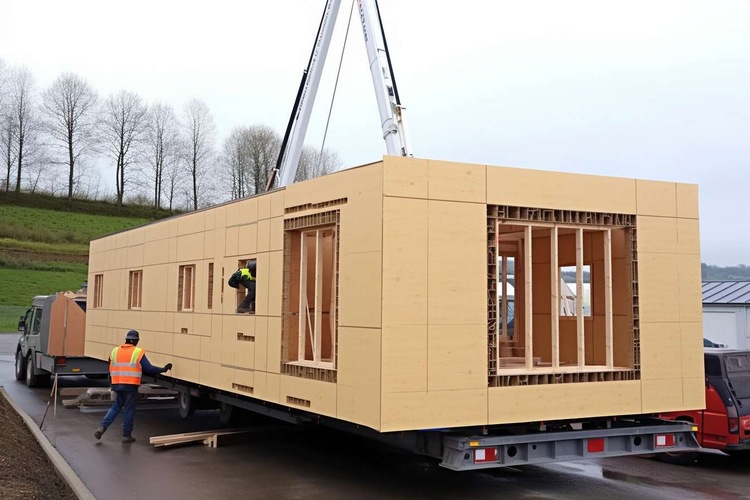Modular and Prefab Homes in Ireland 2026 Overview
Modular and prefabricated homes are increasingly considered within Ireland's housing sector in 2026. These homes are constructed in factory settings before assembly on-site, offering an alternative to traditional building methods. This article reviews key aspects relevant for home buyers and developers in Ireland.

Modern Modular and Prefabricated Homes in Ireland
Modular and prefabricated (prefab) homes refer to residential buildings produced primarily in factories using standardized sections, or modules, which are then transported and assembled on-site. In Ireland, these methods have evolved to cover a range of housing types, from small ancillary units to complete family homes. Building components are manufactured indoors, which can provide better quality control compared to some traditional building methods.
Types and Applications
In Ireland, modular and prefab homes can serve various purposes:
- Garden Rooms or Home Offices: Smaller units suitable for work-from-home needs.
- Starter Homes: Compact two- or three-bedroom houses targeting first-time buyers.
- Family Homes: Larger modular constructions designed to meet planning and residential standards for permanent living.
- Rural and Self-build Projects: Modular elements may facilitate easier construction in remote locations.
The flexibility in size, design, and functionality allows for modular and prefab homes to address diverse housing demands across urban and rural Ireland.
Construction Process and Materials
Modular homes are typically produced in controlled factory settings where building sections are constructed with precision. Common structural materials include:
- Steel Frames: Providing durability and strength, increasingly used in modern modular builds.
- Timber Frames: Traditional material option for modular constructions.
- Insulation and External Cladding: Installed in factory conditions to meet Irish building standards (e.g., thermal efficiency, weatherproofing).
After manufacture, modules are transported to the building site where foundation work must be completed in advance. Modules are then lifted into position and connected, incorporating interior finishes and, often, utility systems. This process can reduce the time spent exposed to weather delays compared to purely on-site builds.
Design Flexibility and Regulatory Compliance
Modular home designs in Ireland generally adhere to national building regulations, including compliance with the Technical Guidance Documents (TGD) and Building Control Authorities’ requirements. Planning permission remains necessary for most permanent modular housing unless specific exemptions apply.
While modular homes are often perceived as uniform, many manufacturers and builders in Ireland allow customisation of layouts, finishes, and fixtures to accommodate different preferences and site-specific conditions. Design flexibility depends on the provider and module system employed.
Build Duration and Site Considerations
Compared to traditional construction methods, the on-site assembly of modular homes typically takes less time as the main fabrication occurs off-site. This can help reduce the overall project timeline, though lead times for manufacturing modules vary depending on complexity and demand.
Site preparation in Ireland involves standard groundworks such as foundations, drainage, and utility connections, which must be coordinated before module installation. Terrain, access, and local planning requirements influence site readiness and timing.
Typical Costs in Ireland (2026)
When considering modular and prefab homes in Ireland, typical price ranges include:
- Basic Option: Approximately €120,000 to €160,000 - generally smaller homes with standard finishes, suitable as secondary dwellings or starter units.
- Standard Option: Around €160,000 to €250,000 - includes larger floor areas, a selection of customization, and higher quality finishes aimed at family accommodation.
- Premium Option: €250,000 to €350,000+ - offering bespoke designs, premium materials, advanced energy efficiency features, and turnkey installation with utility connections.
These figures exclude the cost of land acquisition, planning permission applications, site preparation, and utility connections, which vary according to location and plot conditions in Ireland.
Energy Efficiency and Sustainability
Modular homes in Ireland can potentially incorporate energy-efficient design principles and technologies to comply with the current building regulations and national targets for carbon reduction. Controlled factory conditions allow for better insulation and tighter building envelopes.
Some modular constructions include features such as:
- High-performance triple-glazed windows
- Mechanical ventilation with heat recovery (MVHR)
- Renewable energy systems (e.g., solar panels, heat pumps)
These aspects contribute to lower energy consumption and support Ireland’s goals for sustainable housing.
Planning Permission and Building Regulations
Obtaining planning permission is typically required for permanent modular homes in Ireland, with similar considerations as traditional builds. Applications must address site suitability, design compatibility, impact on neighbours and environment, and compliance with local development plans.
Building Control Authorities oversee compliance with the Building Regulations, which include standards for structural safety, fire safety, energy use, ventilation, and accessibility. Modular home components and completed structures undergo certification and inspection processes.
Documents such as the mandatory Commencement Notice and completion certification are part of the regulatory framework.
Market Overview in Ireland (2026)
The use of modular and prefabricated homes in Ireland is part of a broader trend towards alternative construction technologies responding to challenges in traditional housing supply, costs, and construction timelines. Modular building firms and design professionals operate across various counties, with manufacturing hubs commonly located in the west and midlands.
Buyer interest often focuses on the quality, build times, and regulatory compliance aspects. More detailed costing and planning considerations arise on a case-by-case basis depending on site specifics and desired home features.
Summary
Modular and prefab homes represent a method of housing construction that has gained increasing attention in Ireland in 2026. By manufacturing building sections in factories and assembling on-site, these homes offer distinct attributes compared to conventional construction. Their suitability depends on individual preferences, site conditions, and regulatory compliance. Understanding the technical, financial, and planning aspects can assist those exploring modular housing options within the Irish context.




